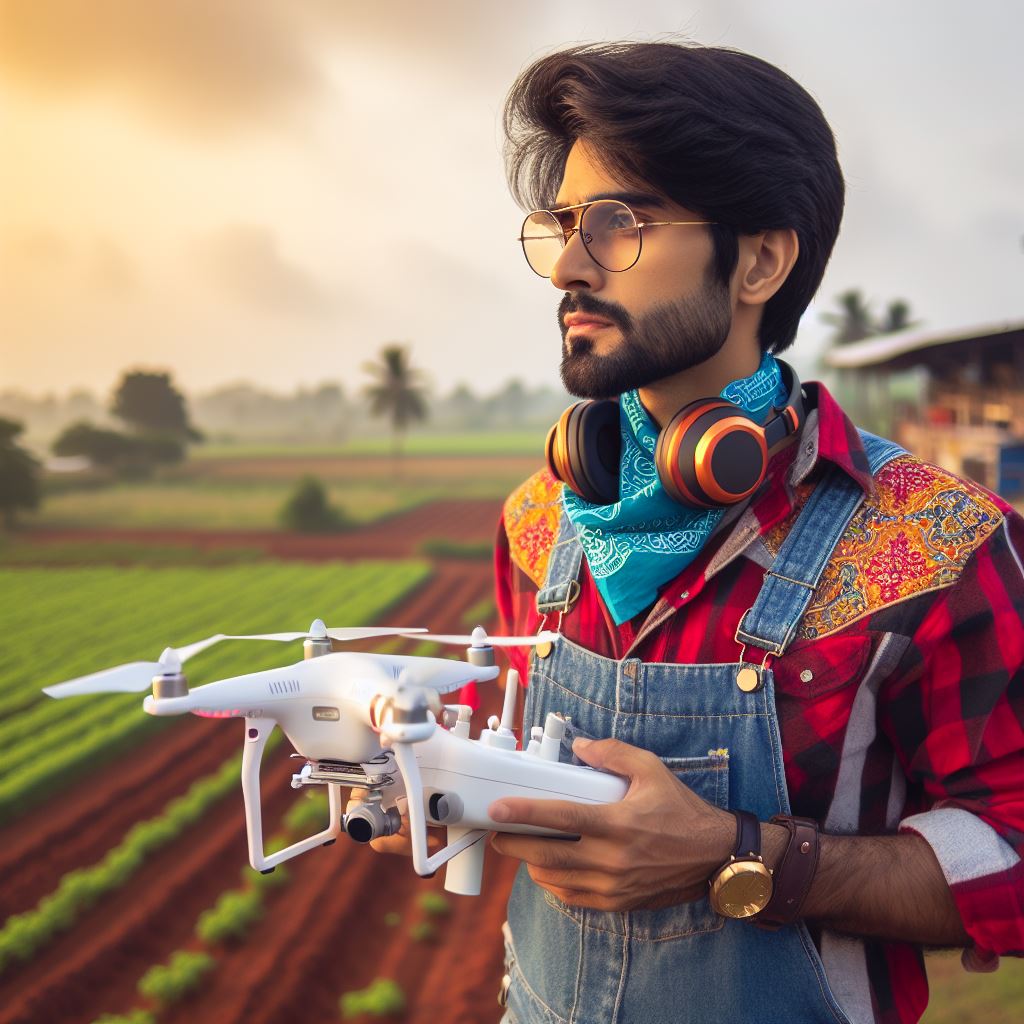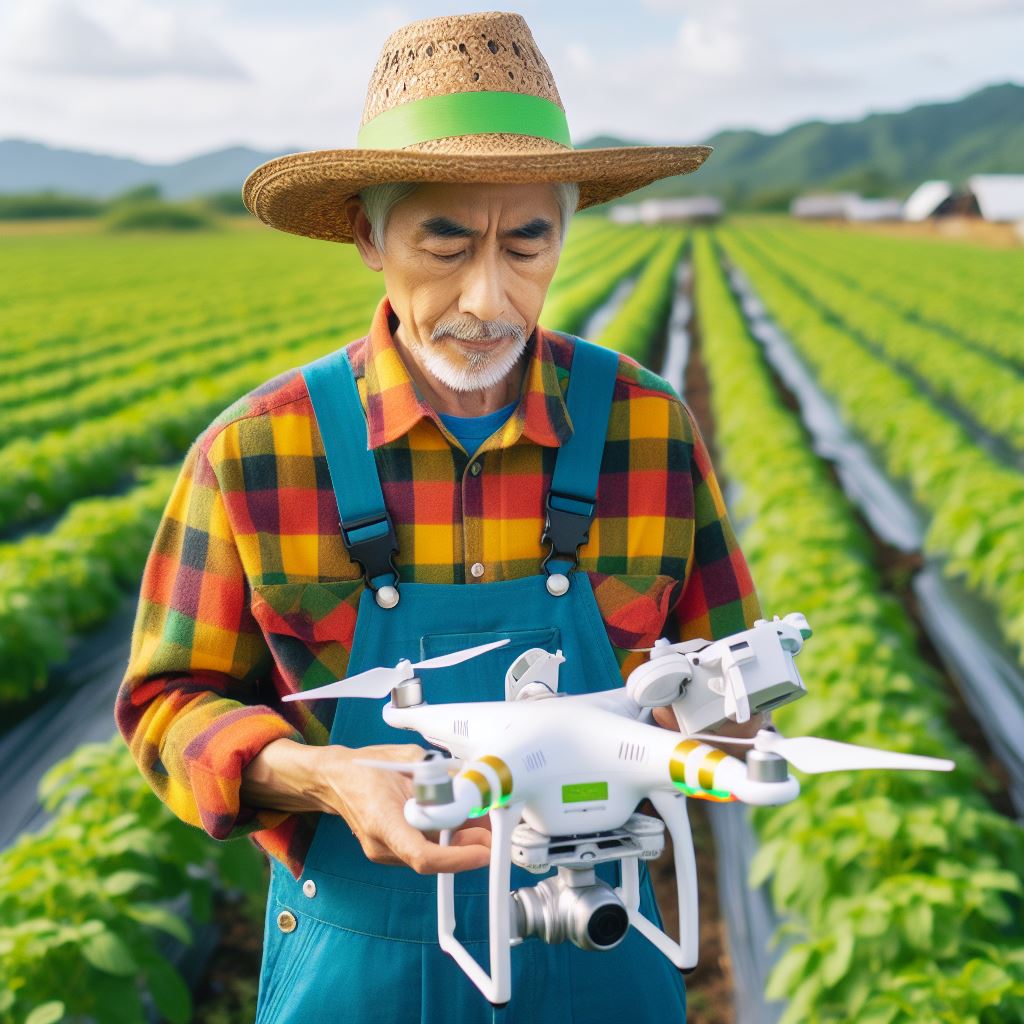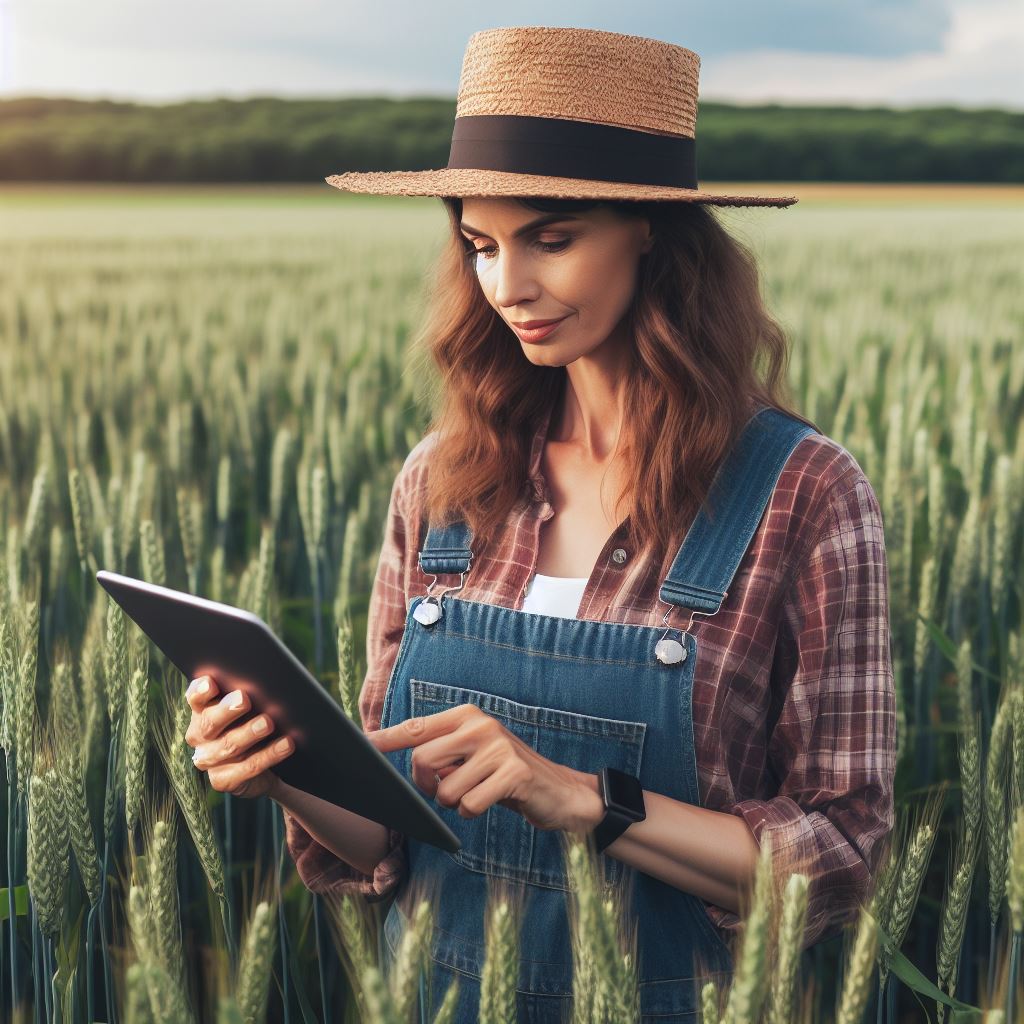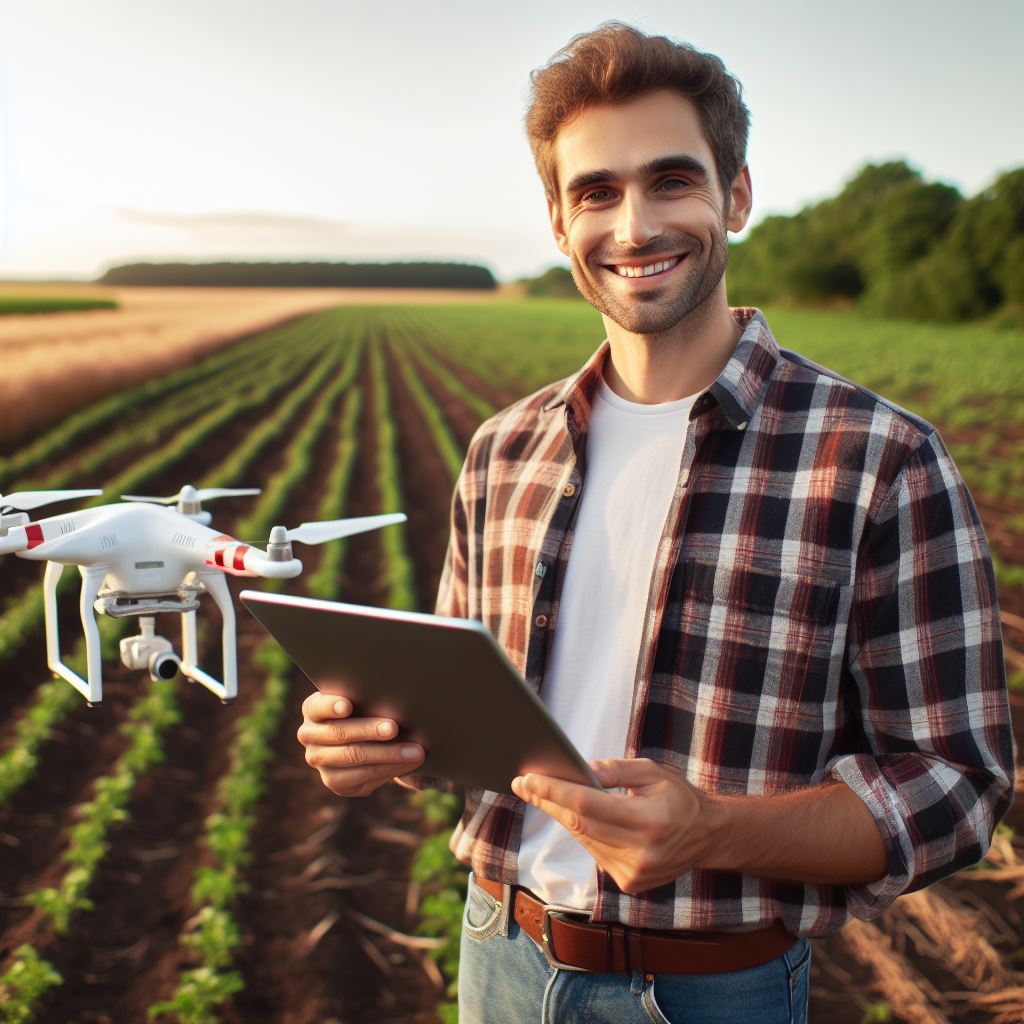Introduction
Farm drones, unmanned aerial vehicles equipped with cameras and sensors, are revolutionizing crop management in farming.
Definition of farm drones
Farm drones are small aircraft that can be remotely controlled and are used for various tasks in agricultural settings.
Importance of crop management in farming
Effective crop management is crucial for maximizing yield, reducing costs, and maintaining sustainable agriculture practices.
Overview of how farm drones are revolutionizing crop management
Farm drones are changing the way farmers monitor and manage their crops by providing real-time data and actionable insights.
These drones can capture high-resolution images of fields, allowing farmers to detect crop stress, disease, or nutrient deficiencies.
With this information, farmers can take proactive measures such as adjusting irrigation, applying targeted treatments, or optimizing fertilization.
Moreover, farm drones enable farmers to assess the overall health of their crops, monitor growth patterns, and identify specific areas that require attention.
This technology saves significant time and resources compared to traditional manual monitoring methods.
Farm drones also enhance precision agriculture practices, as they can identify variability within fields, enabling farmers to tailor inputs based on localized conditions.
The data collected by farm drones can be integrated with other farming technologies, such as GPS and data analytics, for efficient and sustainable crop management.
Basically, farm drones have emerged as a game-changer in crop management, offering farmers real-time insights and enabling precise decision-making, ultimately leading to increased productivity and reduced environmental impact.
Benefits of using farm drones in crop management
Increased efficiency and speed in data collection
Farm drones have revolutionized crop management by significantly improving the efficiency and speed of data collection.
They can quickly scan large areas of farmland, capturing valuable information in a fraction of the time it would take traditional methods.
Improved accuracy in monitoring and assessing crop health
The use of drones in crop management allows for highly accurate monitoring and assessment of crop health.
Drones equipped with specialized sensors can detect subtle changes in vegetation, providing farmers with valuable insights into the health and growth of their crops.
Transform Your Agribusiness
Unlock your farm's potential with expert advice tailored to your needs. Get actionable steps that drive real results.
Get StartedCost savings in terms of labor and resources
One of the major advantages of using farm drones is the cost savings they offer.
By replacing manual labor with drones, farmers can reduce the need for large workforces and save on labor costs.
Additionally, drones require fewer resources to operate, such as fuel and maintenance, further reducing expenses.
Ability to cover large areas of farmland quickly and easily
Farmers often face the challenge of covering large areas of farmland, making it difficult to monitor crops effectively.
However, with the use of drones, this task becomes much easier.
Drones can cover vast distances quickly, providing comprehensive coverage of the entire farmland and ensuring no area is left unattended.
It is evident that farm drones have the potential to revolutionize crop management.
By harnessing the power of advanced technology, farmers can enhance their productivity, reduce costs, and make informed decisions about their crops.
With continued advancements in drone technology, the benefits will only continue to grow, leading to a more sustainable and efficient agriculture industry.
Read: Precision Agriculture: How Drones Change the Game
Role of farm drones in pest and disease management
Early detection of pests and diseases using sensors and imaging technology
Farm drones equipped with sensors and imaging technology can quickly identify the presence of pests and diseases in crops.
The drones can collect data on temperature, humidity, and other environmental factors to determine the risk of infestation.
This early detection allows farmers to take preventive measures and reduce the spread of pests and diseases.
Precision application of pesticides, reducing potential environmental impact
Farm drones can accurately apply pesticides only to areas affected by pests or diseases, minimizing the use of chemicals.
This precision application reduces the potential environmental impact and saves costs for farmers.
By targeting specific areas, drones ensure that pesticides are not sprayed indiscriminately, protecting beneficial insects and other wildlife.
Real-time monitoring to identify infestations and take immediate action
Farm drones provide real-time monitoring of crops, allowing farmers to quickly identify infestations and take immediate action.
The drones can cover large areas in a short time, enabling farmers to detect problems before they become widespread.
By responding promptly, farmers can prevent significant crop losses and minimize the need for extensive pesticide use.
Enhancing crop yield and quality through early intervention
By detecting pests and diseases early, farm drones help farmers intervene at the right time to protect crop yield and quality.
Timely action can prevent the spread of infestations and reduce the damage caused by pests and diseases.
Farmers can make informed decisions on treatment options, such as using biological controls or implementing cultural practices.
Improving overall crop management practices
The use of farm drones in pest and disease management contributes to the improvement of overall crop management practices.
Farmers can collect data on pest and disease patterns, which can be used for future decision-making and planning.
Showcase Your Farming Business
Publish your professional farming services profile on our blog for a one-time fee of $200 and reach a dedicated audience of farmers and agribusiness owners.
Publish Your ProfileDrones facilitate precision farming, where resources are used efficiently and interventions are targeted.
Overcoming challenges and considerations
- Integration of drone technology into existing farming practices requires training and investment.
- Regulations and airspace restrictions may limit the use of farm drones in certain areas.
- Privacy concerns related to data collection and sharing need to be addressed.
- Ongoing advancements in drone technology and software will further enhance their capabilities in pest and disease management.
Farm drones play a crucial role in pest and disease management by offering early detection, precision application of pesticides, and real-time monitoring.
By using drones, farmers can intervene at the right time, ensuring higher crop yield, quality, and overall improved crop management practices.
While there are challenges to overcome, the benefits of using farm drones in the agricultural sector are significant and promising for the future.
Read: Drones in Agriculture: The Future of Farming
Utilization of Farm Drones in Irrigation Management
Aerial Monitoring and Analysis of Soil Moisture Levels
Farm drones have revolutionized crop management by allowing aerial monitoring and analysis of soil moisture levels.
Drones equipped with sensors can provide real-time data on the moisture content of the soil.
This data helps farmers make informed decisions on when and where to irrigate, optimizing water usage.
By identifying areas with low moisture levels, farmers can take proactive measures to prevent crop damage.
Precision Irrigation Using Data-Driven Insights
Farm drones provide valuable insights through data collection and analysis, enabling precision irrigation techniques.
By analyzing data on soil moisture, temperature, and crop health, drones can create irrigation plans tailored to each specific area.
These data-driven insights allow precise delivery of water to crops, ensuring optimal growth and minimizing water wastage.
Farmers can save time and resources by implementing targeted irrigation strategies based on accurate drone data.
Reduction in Water Waste and Improved Water Conservation
One of the key advantages of using farm drones in irrigation management is the reduction in water waste.
Drones enable farmers to apply water directly to the crops, minimizing runoff and evaporation.
By monitoring soil moisture levels, farmers can determine the exact amount of water needed for optimal growth.
This precision irrigation technique leads to improved water conservation, as excess water is not wasted.
Enhanced Efficiency and Cost Savings
Another benefit of utilizing farm drones in irrigation management is enhanced efficiency and cost savings.
By automating the irrigation process, farmers can save time and labor traditionally spent manually monitoring and irrigating crops.
Drones can cover large areas quickly, enabling farmers to manage irrigation more effectively.
The use of drones also reduces the need for excessive water usage, resulting in cost savings for farmers.
Early Detection of Irrigation Issues and Crop Stress
Farm drones equipped with advanced imaging technology can detect irrigation issues and crop stress at an early stage.
Through infrared imaging, drones can identify areas with insufficient water supply or high stress levels in crops.
Farmers can promptly address these issues, preventing potential yield loss and ensuring optimal crop health.
Early detection allows for timely intervention, enhancing overall crop management and maximizing productivity.
Integration with Automated Irrigation Systems
Farm drones can be integrated with automated irrigation systems for seamless irrigation management.
Using drone data, automated systems can adjust watering schedules and delivery based on real-time crop needs.
This integration streamlines the irrigation process, eliminating the guesswork and minimizing human error.
Farmers can rely on the accuracy of drone data to optimize their irrigation systems and improve crop yields.
Futuristic Potential and Continued Innovation
The utilization of farm drones in irrigation management represents just the beginning of their potential.
Future advancements in drone technology may include improved sensors, predictive analytics, and autonomous capabilities.
Continued innovation will further enhance farm drone capabilities, revolutionizing crop management for increased productivity and sustainability.
By harnessing the power of farm drones, farmers can transform their irrigation management practices, leading to significant improvements in crop yields, water conservation, and cost savings.
These technological advancements have the potential to revolutionize the agricultural industry, making it more efficient, sustainable, and profitable.
Read: Revolutionizing Farms: Drones in Crop Monitoring
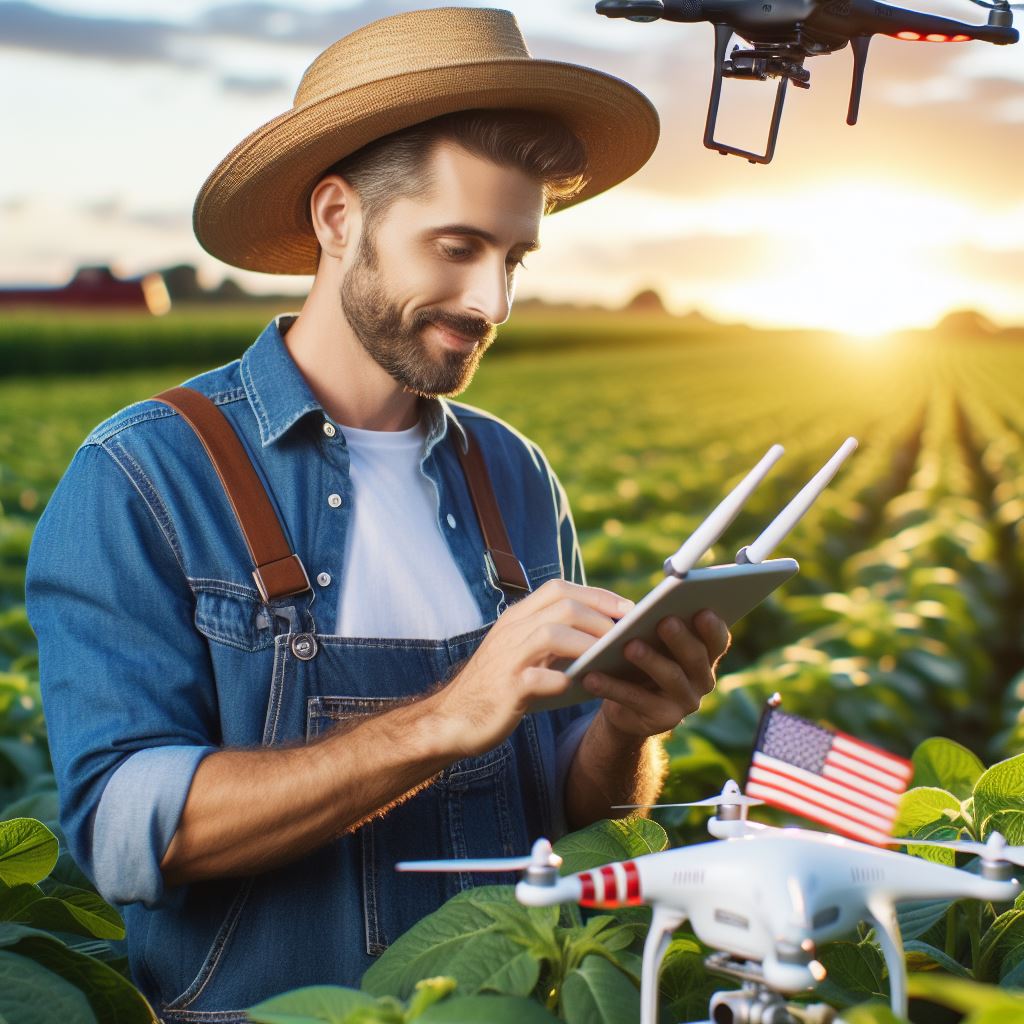
Integration of farm drones in crop yield optimization
Farm drones, also known as agricultural drones, have revolutionized crop management in recent years.
These unmanned aerial vehicles (UAVs) have proven to be valuable tools in optimizing crop yield and improving overall farm productivity.
By integrating farm drones into crop yield optimization techniques, farmers can enhance their decision-making processes and achieve higher levels of efficiency.
Remote sensing to gather data on crop growth and biomass
One of the key benefits of utilizing farm drones is their ability to perform remote sensing.
Through the use of advanced imaging technology, drones can gather important data on crop growth and biomass.
Showcase Your Farming Business
Publish your professional farming services profile on our blog for a one-time fee of $200 and reach a dedicated audience of farmers and agribusiness owners.
Publish Your ProfileThis enables farmers to monitor the health and development of their crops without the need for physical presence in the fields.
By regularly collecting and analyzing this data, farmers can make informed decisions regarding planting, irrigation, and pest control measures.
Mapping and analysis of yield variability across fields
Another way in which farm drones are revolutionizing crop management is through mapping and analysis of yield variability across fields.
Drones equipped with specialized cameras and sensors can capture high-resolution images of the entire farm area.
These images are then processed using sophisticated software to create detailed maps that highlight variations in crop yield.
By identifying areas of low productivity, farmers can implement targeted interventions to improve yield, such as adjusting irrigation levels or applying specific treatments.
Targeted application of fertilizers and nutrients to optimize yield
Farm drones also play a crucial role in optimizing yield by enabling targeted application of fertilizers and nutrients.
By precisely identifying areas that require additional nutrients, drones can apply fertilizers in a highly efficient and cost-effective manner.
This prevents wastage and ensures that crops receive the necessary nutrients for optimal growth and yield.
Through the use of sophisticated algorithms and real-time data analysis, farm drones can also adjust fertilizer application rates based on specific crop requirements, resulting in even greater yield improvements.
Effectiveness in crop management
Moreover, the integration of farm drones with other technology systems, such as GPS and automated irrigation systems, further enhances their effectiveness in crop management.
Drones with GPS capabilities can navigate through fields with precision, collecting data from specific locations and ensuring accurate mapping.
This integration allows farmers to create customized management plans for individual fields, taking into account their unique characteristics and requirements.
In addition to optimizing crop yield, farm drones also offer numerous environmental advantages.
By enabling targeted application of fertilizers and pesticides, drones minimize the use of chemicals, reducing the potential negative impact on soil and water quality.
Furthermore, by providing timely information on crop health and pest infestations, drones allow farmers to address issues promptly, mitigating the risk of crop loss and minimizing the need for excessive pesticide use.
In a nutshell, farm drones are revolutionizing crop management by integrating advanced technologies into traditional farming practices.
Through remote sensing, mapping and analysis of yield variability, and targeted application of nutrients, these UAVs enable farmers to optimize crop yield and improve overall farm productivity.
The integration of farm drones with other technology systems further enhances their effectiveness, while also offering environmental benefits.
As technology continues to evolve, the potential for farm drones to revolutionize crop management will only continue to grow.
Read: Drones in Agri: Irrigation Game Changer
Gain More Insights: AI’s Role in Modern Farming Techniques
Addressing concerns and challenges associated with farm drones
Regulations and licensing requirements for drone operation
- Compliance with government regulations is crucial for safe and legal farm drone operations.
- Pilots need to obtain the necessary licenses and permits to fly drones on agricultural land.
- Strict adherence to airspace guidelines guarantees the safety of both the drones and surrounding areas.
- Regular updates on regulations should be followed to ensure compliance and avoid legal issues.
- Understanding the restrictions on flight altitude, distance from populated areas, and flight times is essential.
Security and protection of data collected by drones
- Implementing robust data encryption protocols safeguards sensitive farm information gathered by drones.
- Data stored on secure servers and cloud platforms enhances privacy and minimizes the risk of unauthorized access.
- Farms must establish data access controls and employ encryption algorithms to protect information during transmission.
- Regular system audits should be conducted to identify vulnerabilities and protect against potential cyber threats.
- Collaborating with cybersecurity experts can help farm owners enhance protection and mitigate data breaches.
Initial investment and ongoing maintenance costs:
- Farms must consider the initial investment required to purchase drones and necessary supporting equipment.
- Conducting cost-benefit analyses helps determine the viability of integrating drones into crop management.
- Ongoing maintenance costs, such as battery replacements and software updates, should be factored into budgets.
- Proper training for drone operators reduces the risk of accidental damage and minimizes repair costs.
- Collaborating with drone manufacturers or service providers can provide cost-effective maintenance solutions.
Benefits of overcoming concerns and challenges
- Farm drones provide real-time data on soil conditions, crop health, and water usage, facilitating precise decision-making.
- Accurate aerial surveys and remote sensing capabilities greatly enhance crop monitoring and yield predictions.
- Improved pest and disease detection enables targeted interventions, reducing the need for excessive pesticide use.
- Drones increase operational efficiency by automating tasks such as seeding, spraying, and crop inspection.
- Timely and accurate information offered by drones helps farmers optimize resource allocation and maximize productivity.
- The ability to cover large areas in a short time enhances overall farm management and reduces labor-intensive processes.
Implementing farm drones in crop management brings numerous benefits, but concerns should not be overlooked.
Regulations, data security, and cost considerations must be addressed to ensure successful adoption and long-term sustainability.
By overcoming these challenges, farms can embrace the drone revolution and revolutionize their crop management practices.
Conclusion
Farm drones have proven to be extremely beneficial in revolutionizing crop management.
They offer advantages such as increased efficiency, reduced costs, and improved yields.
It is crucial for farmers to embrace this technology and integrate it into their farming practices.
By doing so, they can benefit from better decision-making, precise application of resources, and early detection of crop problems.
Furthermore, the future prospects for farm drone applications are promising, with potential advancements in areas such as automated harvesting, precision spraying, and crop monitoring.
As technology continues to evolve, farm drones are expected to play an increasingly important role in agriculture, helping farmers overcome challenges and achieve sustainable farming practices.
Therefore, it is essential for farmers to stay updated with the latest advancements and leverage the full potential of farm drone technology for the long-term success of their crop management.

